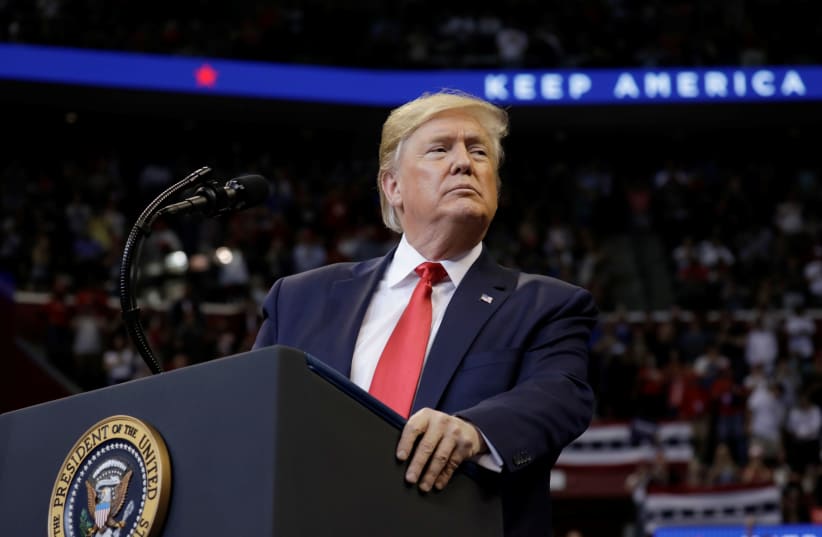But if the Republican president is hoping for a public backlash like the one against the 1998 impeachment of Democratic President Bill Clinton, it has so far not worked out that way, Reuters/Ipsos polling data over the past few months shows.
In fact, the House of Representatives' impeachment investigation has fueled an equally fervent demand among Democrats to hold the Republican president accountable for his efforts to pressure Ukraine to investigate Democratic political rival Joe Biden, according to a review of polls conducted every week since Sept. 24 when the Ukraine scandal broke.
Trump is expected later this week to become the third U.S. president to be impeached when the full Democratic-led House votes on articles of impeachment charging him with abusing the power of his office and obstructing Congress' investigation of the matter.
That would set up a trial in the Republican-controlled Senate, which is unlikely to vote to remove him from office. Trump has denied wrongdoing and called the impeachment inquiry a hoax.
Since House Democrats launched the impeachment inquiry, the Trump campaign has sent talking points to Republican Party officials across the United States, trying to turn the crisis into a political advantage, according to aides and an internal campaign document seen by Reuters.
“Any time people try to lessen this legitimate president, in any way, his voters fight back,” Trump campaign manager Brad Parscale told reporters on Thursday. The Republicans' model looking forward could be the 1998 Clinton impeachment.
Gallup polling at the time showed that Clinton’s popularity grew in a bipartisan fashion during the House proceedings, peaking at 73% at the time of the impeachment vote.
Clinton, who was impeached for lying about a sexual relationship he had with a White House intern, emerged in a stronger political position after he was acquitted in a Senate trial in early 1999.
But Americans are reacting much differently in 2019.
Trump's approval rating has hovered around 40% all year, changing little during the past three months. Furthermore, his support has been flat over the past several months among whites without a college degree - his core political base - and he was less popular in rural America in November than he was in June.
The Reuters/Ipsos poll also shows that Democrats are even more committed to impeaching Trump now than they were earlier this year and worry less about the impact it may have on the 2020 election.
While total support for impeachment has been steady over the past several weeks at around 45%, it has risen by 12 percentage points among Democrats since late September, with 78% saying in the latest poll on Dec. 9 and 10 that Trump should be impeached.
Among Republicans, opposition to impeachment has been relatively unchanged throughout the same period, with about 82% saying in the latest poll that he should not be impeached.
In addition, only 27% of Democrats said in December that their party should drop impeachment if that weakened their chances of beating Trump in the November election, down 7 points from a similar poll that ran in early October.
MOTIVATED ON BOTH SIDES
Political engagement has been soaring across the United States since Trump took office in January 2017, with record turnout in many of the statewide and congressional races that followed.
So far, the impeachment proceedings do not appear to have cranked it higher. Those who want to impeach Trump are not more interested in voting now than they were when the House inquiry started in September, according to the Reuters/Ipsos poll. The same goes for those who do not want to impeach Trump.
The mixed results have led some Republican officials in crucial battleground states to fret over the benefits of a prolonged impeachment debate, even as the campaign sees it as a major boost in firing up the base.
Nearly 100,000 voters have asked to become volunteers to knock on doors and hold grassroots events for Trump’s re-election effort since the impeachment inquiry, Rick Gorka, a senior member of the Republican National Committee and part of the Trump Victory re-election campaign, told Reuters.
Republican officials in all 50 states are also being sent talking points and data multiple times a week, Gorka said.
One "state party packet" seen by Reuters, dated last Tuesday and entitled “Rigged Partisan Witch Hunt," is filled with impeachment messaging, suggested tweets, polling data and graphics that paint the impeachment effort as a Democratic "sham" to try to overturn Trump’s 2016 election victory.
But Terry Dittrich, chairman of the Waukesha County Republican Party in Wisconsin, warned that prolonged proceedings could turn voter attention away from what they view as Trump's greatest political strengths, such as the strong economy.
"Our constituents, here in Wisconsin, they just want this to be over," Dittrich said. Trump's narrow victory in the state in 2016 helped propel him to the presidency.
"We want to close this up, we want to move on, so we can remind Wisconsinites of all the accomplishments of President Trump, the roaring economy, low interest rates, and the lowest unemployment numbers for African-Americans."
